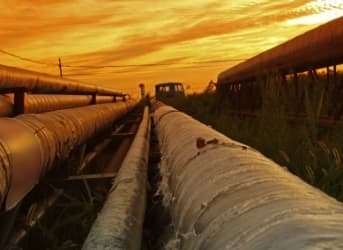A key natural gas pipeline that would have connected shale gas from Pennsylvania to the northeast U.S. was blocked on April 22 by New York regulators. The incident reveals the growing difficulty that fossil fuel companies are having in the United States, as opposition to energy infrastructure spreads.
The Constitution Pipeline, backed by Williams Partners and Cabot Oil & Gas, was not a major pipeline in terms of distance – it would only stretch 124 miles. But it would link up the vast Marcellus Shale to the huge demand centers in Boston and the rest of New England. Williams Partners says the pipeline would create 1,300 jobs or so, and would provide cheap natural gas to the northeast.
But environmental groups and local landowners are not convinced. They fear the negative side effects on land and water. Trees have to be clear cut to make way for the route. Food & Water Watch, an environmental group, said that the pipeline would cross 277 known bodies of water and a leak would devastate drinking water resources. Related: The Merger That Could Create a New Oil Major
New York Governor Andrew Cuomo clearly heard them. The Constitution Pipeline was supposed to have been completed in 2015, but suffered years of delay as it struggled to obtain necessary regulatory approvals. On April 22 his administration denied key permits to the pipeline project, arguing that the pipeline does not meet the state’s water standards. The pipeline would have crossed several New York counties before it could connect with a larger transmission system near Albany.
(Click to enlarge)
“Governor Andrew Cuomo sent a clear message by rejecting the Constitution Pipeline: New Yorkers’ health and safety will not be sacrificed for fossil fuel industry profits. With this decision, he protected the people of New York and took an important step toward embracing a true renewable energy future,” environmental group Food and Water Watch said in a statement.
The industry sees something more pernicious. They argue that politics are affecting the regulatory process, which is bogging down infrastructure across the country. Just as with the Keystone XL Pipeline, which became a huge battle between the oil and gas industry on the one hand, and environmental groups on the other. The rhetoric and the ferocity of that fight exceeded the importance of the project, and it came to symbolize a broader clash of priorities. Ultimately, environmental groups prevailed after President Obama rejected the pipeline on climate grounds. Related: OPEC’s No. 2 Under Serious Threat From Political Instability
But environmental groups are parlaying that success, taking the fight to more and more pieces of energy infrastructure. The so-called “Keystone-ization” of the fossil fuel world is starting to seriously worry oil executives. More and more pipelines are succumbing to protest.
“What we are seeing, unfortunately…is that every gas pipeline project out there is being treated in the same way that Keystone was,” Martin Durbin, Executive Vice President, American Petroleum Institute, said at an event held in Washington DC by The Atlantic Council in late April.
Environmental groups oppose pipelines, citing safety and pollution concerns, but Durbin dismissed those arguments. “None of those things are true. But I do have to say, it is going to take a concerted effort, not only inside of industry but all of those who are going to be benefitting from this” to explain the benefits of natural gas, Durbin said.
The rejection of permits for the Constitution Pipeline came only a few weeks after Kinder Morgan saw its Palmetto Pipeline in coastal Georgia blocked by a judge. The pipeline would have carried 167,000 barrels per day of refined products to Georgia and Florida, but is now stalled. Also, Kinder Morgan scrapped its Northeast Energy Direct pipeline, a gas pipeline across Massachusetts, because of low natural gas prices and regulatory hurdles. In Oregon, federal regulators rejected a pipeline project that would have fed a proposed LNG export terminal on the Pacific Coast, in part because of the costs that it would have imposed on landowners. Related: Low Oil Prices? Texas Is Doing Just Fine
The term “Keystone-ization” was inadvertently coined by API’s Martin Durbin. Environmental groups don’t have a problem with the term, and are taking up the phrase and its implied strategy. “Every coal mine, every frack well, every oil export terminal ... all of them are being met with strict, strict resistance,” said environmental activist Bill McKibben, founder of 350.org, at a protest in April in front of the White House. “There’s people arrested every day now around the country taking on these infrastructure projects, the kind of spread of civil disobedience like we’ve never seen.”
Keystone XL stole all of the attention for several years, but since its rejection in late 2015, environmental activists have killed off several more gas pipelines, many of which have not made national headlines. Future projects will likely meet the same fierce resistance.
By Nick Cunningham of Oilprice.com
More Top Reads From Oilprice.com:
- Why Iran’s Shale Oil Discovery Won’t Add To The Glut
- Oil Prices Edge Lower As OPEC Nears Record Output
- Why China Is Really Dictating the Oil Supply Glut




















I get that people are concerned about formation leaks contaminating ground water, but gas pipeline leaks are generally detected and the environmental impact tends to be minimal.
Or you can just keep following all the rules designed to kill your industry. Your choice.
Natural gas is an inexpensive source of energy. It has to come from somewhere. Guess how they transport petroleum products (including natural gas LNG) where pipelines don't exist...you guessed it...by train. Why do you think hypocrites like Warren Buffet, who owns railroads, fight pipelines? I live within a kilometre of a pipeline. It's been there for over 30 years.
I don't think he will win, but it will be close.